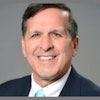
In today's business climate, small businesses are more reliant on the internet and mobile technology than ever before. Unfortunately, many of these businesses do not have a plan in place to protect themselves against cyberthreats.
Is your dental practice prepared to identify and combat a cybersecurity attack? These seven strategies can set your practice up for success and save you thousands of dollars.
1. Develop a comprehensive cybersecurity plan
 Christine Alfano is the senior director of corporate and dental channel marketing at Vyne.
Christine Alfano is the senior director of corporate and dental channel marketing at Vyne.If you are not sure where to start, the Small Biz Cyber Planner 2.0 is a free resource from the Federal Communications Commission (FCC) that helps you create a customized plan, with a menu of expert advice to address your specific business needs and concerns.
2. Train your employees
Proper training can help employees quickly identify and respond to cybersecurity threats such as email phishing scams. Annual security training is recommended to help build awareness among your teams and is common practice with larger corporations. This article contains tips for training employees on cybersecurity.
3. Effectively protect your data, computers, and networks
Always maintain the latest versions of software on your office computers as updates are frequently made to address security issues. If you do not operate on the latest platforms, your systems could be more vulnerable. Also, consider requiring employees to use unique passwords and change them every three months.
4. Address mobile device security
Know how employees use mobile devices for work and create a security plan that covers your practice's data accessed or stored on them. Consider requiring employees to password protect their devices, encrypt their data, and install security apps, as well as create reporting procedures for lost or stolen equipment.
5. Implement a secure email tool
Use a secure email service to communicate with patients, payors, and other providers to ensure that protected health information (PHI) is not accessible to an unintended recipient. Use a service like Vyne Connect encrypted email to encrypt messages sent outside your office.
6. Limit access to data
Limiting employee access to certain types of data can help protect your practice's most sensitive data in the event of a breach. Give access to only those employees that truly need it, and, even then, add levels of protection such as additional passwords and encryption.
7. Seek expert advice
Cybersecurity is nothing to take lightly. If you need help, reach out to a HIPAA and IT security expert for guidance, or, if budget allows, consider hiring a full- or part-time staff member. A professional can easily spot weaknesses in your system and advise how to correct it. The cost of not doing so could be a lot more than the cost of doing it correctly.
While you typically hear about breaches in major companies or government entities, just think -- if a major corporation with protective measures in place can be vulnerable, what is stopping your practice from being a target?
Make your practice's data security a priority in 2020 to ensure your data are safe and minimize vulnerability. A minimal upfront investment will be worth it in the long run and can safeguard your practice from the pain and cost of dealing with a data breach.
Christine Alfano is the senior director of marketing for Vyne and leads corporate and dental channel marketing for the organization. FastAttach software is a HITRUST CSF-certified electronic claim attachment solution by NEA Powered by Vyne, a recognized leader in the dental industry delivering operational efficiency and financial performance for providers and payors. NEA partners with more than 750 dental plans and payers to enable practices to exchange supporting documentation in a HIPAA-compliant manner. Learn more at www.nea-fast.com.
The comments and observations expressed herein do not necessarily reflect the opinions of DrBicuspid.com, nor should they be construed as an endorsement or admonishment of any particular idea, vendor, or organization.



















